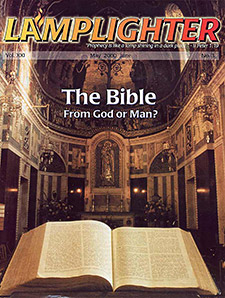The Bible
Is it Man’s search for God or God’s revelation to Man?

“All Scripture is inspired by God and profitable for teaching, for reproof, for correction, for training in righteousness…”
— The Apostle Paul in 2 Timothy 3:16
“I could not believe that anyone… would be so foolish as to proclaim that the Bible in every literal word was the divinely inspired, inerrant Word of God.”
— John Shelby Spong, Episcopal Bishop of Newark
Is the Bible the Word of God as the Apostle Paul contends in 2 Timothy 3:16, or is it a creation of Man, and thus full of myth, legend, and superstition, as Bishop Spong asserts?
A good portion of the Church today is apostate, worldly, and apathetic because many Christian leaders have rejected the Bible as God’s revelation to Man and have bought, instead, the Satanic idea that the Bible is a product of Man’s search for God.
This rejection of the Bible as God’s Word is a product of the German School of Higher Criticism whose philosophy invaded this country at the turn of the 20th Century and hit our seminaries with the impact of a nuclear bomb. Confidence in the Scriptures was destroyed almost overnight as seminary students were taught to approach the Bible with skepticism. No longer were the Scriptures viewed as the inspired Word of God to be handled with reverence and to be believed and obeyed. Rather, the Bible was viewed like any other piece of literature, to be analyzed, dissected, and criticized.
The authority of God’s Word was undermined. One significant result was that preaching lost its power as pastors began to base their sermons on modern psychology, philosophy, and theology. As the 20th Century progressed, liberal theologians intensified their attack on the Bible, determined to destroy its influence on the common person in the pew.
The “Non-Sexist” Version
This deflated view of the Bible as just another piece of literature was what motivated the National Council of Churches in 1981 to announce its intention to re-write the Bible to remove “sexist” language. The Council committee in charge of the revision stated that male connotations of God as Lord, King, Father, or He are “accidents of the limitations of human language.” The committee recommended that God be referred to as the “Creator” rather than as “Father,” that Jesus be called the “Child of God” rather than the “Son of God,” and that the Holy Spirit be referred to as “It” rather than “He.”
The committee also recommended that the word “children” be substituted for “sons.” Perhaps the greatest absurdity was the committee’s idea that equal time be given to women by adding the names of wives to the text each time the husband is mentioned. Thus, each reference to Abraham would become “Abraham and Sarah” — whether Sarah was present or not!
The “Condensed” Version
In 1982 The Reader’s Digest published its condensed version of the Bible. Again, approaching the Bible as if it were a great novel or a Shakespearean play, the editors of The Reader’s Digest cut out 50% of the Old Testament (including 68 of the 150 Psalms!), 25% of the New Testament, and 10% of the words of Jesus.
They also cut out Revelation 22:18-19 which says: “I warn everyone who hears the words of the prophecy of this book: if anyone adds to them, God will add to him the plagues described in this book, and if anyone takes away from the words of the book of this prophecy, God will take away his share in the tree of life and in the holy city, which are described in the book.”
The “Expurgated” Version
The process of debunking the Bible reached its climax in 1985 when Robert Funk, a New Testament scholar at the University of Montana, formed a Bible research group which he called The Jesus Seminar. The avowed purpose of the Seminar was “to renew the quest for the historical Jesus.” The Seminar conducted this quest in a very unusual way. Meeting twice a year for six years, the group voted on each of the sayings of Jesus recorded in the Gospels. They voted by dropping colored beads in a box. A black bead meant Jesus definitely did not make the statement in question. A gray bead meant he did not say it, but it might have represented His thinking. A pink bead meant He probably said something like this, but not in the words recorded. A red bead meant He definitely made the statement.
As you can see, the very approach expressed contempt for the veracity of the Gospel accounts. What a spectacle this must have been to the Lord as He watched these so-called scholars vote on passages from His Word. “Professing to be wise, they became fools” (Romans 1:22).
The final product of the Seminar, published in 1993, was a blasphemy of God’s Word. It was titled, The Five Gospels. The title comes from the fact that the Seminar decided to grant the apocryphal Gospel of Thomas equal standing with the four traditional Gospels.
Only fifteen sayings of Jesus made it into The Five Gospels in red! In Matthew’s account of the Lord’s Prayer, the only words that made it in red were, “Our Father.” Only one saying in the entire book of Mark was colored red. It is the statement of Jesus in Mark 12:17 where He told His disciples to “Render unto Caesar the things that are Caesar’s, and to God the things that are God’s.” Likewise, only one statement from the Gospel of John qualified for the red coloring: “A prophet has no honor in his own country” (John 4:44).
The chilling thing to keep in mind is that the men who produced this spiritual pornography are professors at seminaries across America. They are the ones who are training the current generation of pastors and teachers.
The “Edited” Version
Liberals are not the only ones who play games with God’s Word. Many Evangelical Christians who profess to believe that the Bible is the revealed Word of God, proceed to deny that profession by their actions. For example, I grew up in a fundamentalist heritage that revered the Bible as the Word of God, but we never read or studied the Old Testament. In fact, we took an axe to the Old Testament. We considered it irrelevant to Christian living because we said it had been “nailed to the Cross.” You can imagine my sense of surprise when I discovered that the only portion which had been “nailed to the Cross” was the ceremonial and civil laws of the Mosaic Covenant — not the Histories, not the Wisdom Literature, not the Prophets, not the Abrahamic or Davidic Covenants, and not the moral law of the Mosaic Covenant.
I also grew up in a heritage where I was taught that all those portions of the New Testament which speak of the supernatural ceased to be relevant in the First Century. We applied a knife to 1 Corinthians 12 because we refused to believe in spiritual gifts. We used the scissors on passages like Ephesians 6 and Hebrews 1 because we did not believe in demons and angels. And we used a razor blade to cut out verses like James 5:14-15 because we didn’t believe in healing. In short, we were like King Jehoiakim who used a penknife to cut things out of the scroll of Jeremiah which he didn’t like (Jeremiah 36:20-26).
All of us who profess Christ need to stop playing games with the Word of God. All of God’s Word is relevant and meaningful to us today. It was not written to be cannibalized or intellectualized. It was written to be believed and acted upon.
The Authenticity of Scripture
Why should anyone believe that this book called the Bible is different from all other books? What sets it apart? How do we know it came from God?
A good place to start is the fact that the Bible itself claims to be divinely inspired. More than 3,000 times the biblical writers claim to be speaking the words of God. Over and over, the writers say, “Thus says the Lord,” or “The Lord said.” These are the most common phrases in the Bible.
The writers also repeatedly refer to the Scriptures as “the Word of God” (1 Samuel 9:27 and Acts 6:2), and they affirm that it is inspired by God (2 Timothy 3:16).
The Attitude of Jesus
Most importantly, Jesus affirmed the Scriptures as the inspired Word of God. On one occasion, as Jesus was teaching, He was interrupted by a woman who yelled, “Blessed is the womb that bore You!” To which Jesus replied, “On the contrary, blessed are those who hear the Word of God and observe it” (Luke 11:27-28).
In His Sermon on the Mount, delivered early in His ministry, Jesus affirmed that He had come to fulfill the Scriptures, and He asserted that heaven and earth would pass away before one jot (the smallest letter) or tittle (the smallest stroke) of God’s Word would pass away — thus affirming the verbal inspiration of the Scriptures (Matthew 5:18). At the end of His ministry, in the last prayer He prayed with His disciples, Jesus referred to the Scriptures as the Word of God and then added, “Your Word is truth” (John 17:14-17).
Jesus’ life is a testimony to His belief in the divine authority of the Scriptures. At age 12 He confounded the spiritual leaders of Israel with His knowledge of God’s Word (Luke 2:41-51). He used the Scriptures to justify His Messianic claims (Luke 4:16-21). He used Scripture to teach the fundamentals of kingdom living (Matthew 5-7). He used Scripture to confront and confound Satan (Matthew 4:1-11). He used Scripture to teach His disciples after His resurrection (Luke 24:27, 44-45).
Jesus quoted Moses, the Psalms, and the Prophets. And yes, He quoted the two Old Testament books that modern day liberals despise the most — Jonah and Daniel.
The Respect of the Apostles
The disciples of Jesus evidenced the same respect for the Scriptures. The Gospel of Matthew quotes Old Testament passages repeatedly from beginning to end, attempting to prove to Jewish readers that Jesus fulfilled Messianic prophecy.
Paul refers to the Scriptures as “inspired by God” (2 Timothy 3:16). Peter refers to the Hebrew prophets as men who were guided in what they said by “the Spirit of Christ within them” (1 Peter 1:11). The Apostle John asserted that the one who loves the Lord is the one who “keeps His Word” (1 John 2:5).
Circular Reasoning?
Now, having said all of this, I want to pause to point out that I am aware of the fact that I am using the Bible to prove the Bible. I could thus be accused of circular reasoning: “the Bible is the Word of God because the Bible says so.”
Therefore, I must take a moment to point out that you do not commit the error of circular reasoning when you use the Bible to prove the Bible. The reason is very simple. You see, the Bible is not one book! It is a collection of 66 books written by more than 40 authors over a period of 1,600 years.
Therefore, if you quote Jeremiah or Isaiah to substantiate Daniel, or if you quote Daniel to verify Revelation, you are not involved in circular reasoning. Instead, you are quoting altogether independent sources who happen to be bound together between the covers of the same book. Yet the paradox is that the more you read these books, the more you realize that the sources are not all that independent.
Internal Harmony
Here’s my point — the authors of those 66 books came from every walk of life, including kings, peasants, philosophers, fishermen, poets, statesmen, scholars, tax collectors, farmers and medical doctors. They wrote in every conceivable place — palaces, dungeons, prisons, on islands, in the wilderness, in cities and in the midst of wars. They wrote in different moods, ranging from the heights of ecstacy to the depths of despair and sorrow.
They spoke on hundreds of controversial subjects. They wrote in three different languages. They utilized every conceivable literary style — history, law, poetry, biography, memoirs, letters, sermons, drama, parables, prophecy — you name it!
Yet, despite all this diversity, their writings interlock with a harmony and continuity from Genesis to Revelation that can only be explained by pointing to divine inspiration.
Other Evidence
I could present a lot of other evidence that the Bible is the authoritative Word of God, but space does not permit it. I will just mention a few points in passing. One is the wisdom of the Bible’s message and the life-changing impact of that message upon millions of lives throughout history. Another is the detail of its historical records and their accuracy, as confirmed by archeology.
And then, of course, there is the remarkable survival of the Bible despite the efforts of so many to destroy it. The permanence of God’s Word was attested by Isaiah when he wrote, “The grass withers, the flower fades, but the Word of our God stands forever” (Isaiah 40:8).
No book has been so widely sought after in the history of Mankind. It was the first book ever printed, and billions of copies have been printed since. It has been translated into more than 2,000 languages, and over 200 million copies are published each year.
Manuscript Integrity
Another significant factor is that no other group of documents from antiquity can even come close to matching the manuscripts the Bible is based on. The Jews were meticulous in their copying and preservation of scrolls as is attested by the Isaiah manuscript that was found among the Dead Sea Scrolls in 1948. That copy of Isaiah from the First Century revealed no significant differences from what is contained in our modern day Bibles.
The largest number of manuscripts of any ancient writing is 643 for the Iliad. The shortest manuscript time span (the interval between the oldest manuscript and the original writing) is 750 years for the Histories by Pliny the Younger. By comparison, the time span of the New Testament manuscripts is 250 years and the number of manuscripts exceeds 15,000!
Equally startling is the fact that if all these manuscripts were to disappear tomorrow, we could put together nearly all of the New Testament from sources older than the manuscripts. That’s because the writings of the Church Fathers before 300 A.D. contain 36,289 quotes from the New Testament — including all but 11 verses.
Prophetic Verification
Some of the most convincing evidence of the Bible’s divine inspiration is to be found in its prophecies. More than one-fourth of the Bible is prophetic in nature. In addition to the well known Messianic prophecies, there are hundreds of secular prophecies about people, cities and nations — many of which have already been fulfilled in history.
The Messianic prophecies are remarkable in nature. There are more than 300 of them about the First Coming of the Messiah. Many are repetitious, like the prophecy that the Messiah will be descended from the house of David. When the repetitious prophecies are culled out, there remain 108 prophecies that are separate and unique. All 108 were fulfilled in the life of Jesus. That is beyond the realm of probability.
Consider just two of these remarkable prophecies. In Micah 5 we are told the Messiah will be born in “Bethlehem Ephrathah.” That prophecy was given 700 years before Jesus was born in Bethlehem. And notice how precise the prophecy is. It does not simply say that the Messiah will be born in Bethlehem. It says, “Bethlehem Ephrathah.” That’s because there were two Bethlehems in Israel when Micah wrote — one in the north near the Sea of Galilee, and the other in the south near Jerusalem, in the area known as Ephrathah.
Another remarkable Messianic prophecy can be found in Psalm 22 where David wrote that the Messiah would be pierced in His hands and feet (verse 16). That prophecy was written over 1,000 years before the birth of Jesus and over 700 years before the Romans began using crucifixion as a form of execution.
Secular Prophecies
In addition to the Messianic prophecies, the Bible is full of secular prophecies about cities, nations, and individuals. Consider, for example, Micah’s prophecy that Jerusalem and its Temple would be destroyed (Micah 3:11-12). This prophecy was written over 150 years before the Babylonians conquered Jerusalem and destroyed the Temple.
Micah’s contemporary, Isaiah, prophesied that the children of Israel would be taken into captivity, but they would ultimately be released by a man named Cyrus (Isaiah 44:28). This prophecy was written 150 years before the reign of Cyrus who issued the order for the Jews to return home (Ezra 1:1-4).
Jeremiah prophesied that the Babylonian captivity would last exactly 70 years (Jeremiah 29:10). Years later, when Daniel discovered Jeremiah’s prophecy (Daniel 9:2), he calculated that the Jews were in their 69th year of captivity. Believing that Jeremiah was a prophet of God and that his words were inspired of God, Daniel dropped to his knees and prayed for the fulfillment of Jeremiah’s prophecy (Daniel 9:4-19). The next year the prophecy was fulfilled when the first group of Jews were sent back to Jerusalem by Cyrus (Ezra 1:1-4).
Are these remarkable prophecies and their fulfillment a matter of coincidence? I think not. Such prophetic fulfillment is beyond the realm of possibility. It carries the hand print of God.
New Testament Prophecies
The New Testament contains similar prophecies that have been accurately fulfilled in history. Consider the prophecy Jesus made the last time He left the Galilee for Jerusalem. He put a curse upon three towns where He had focused His ministry because they had refused to repent (Matthew 11:20-24). Those towns were Capernaum, Chorazin, and Bethsaida. About 150 years later, a great earthquake destroyed all three. In fact, they were so completely destroyed, that by 1800, critics of the Bible were using these three towns as proof positive that the Bible is full of error. They claimed the towns never existed! Today, you can go visit all three because they have since been discovered by modern archeologists.
In like manner, Jesus prophesied that the city of Jerusalem and its Temple would be completely destroyed. As He put it, “There will not be left one stone upon another” (Luke 21:6). Those words were spoken in about 30 A.D. Forty years later, the Romans conquered the city and totally destroyed the Temple.
Prophecy is one of the most unique features of the Bible. No other book that forms the basis of a religion contains prophecy. There are no prophecies in the Koran, the Book of Mormon, the Hindu Vedras or the sayings of Confucius or Buddha. It is no wonder that the Bible’s prophetic books set the teeth of liberals on edge, for the Bible’s prophetic passages mark it as a book of supernatural origin.
Crucial Questions about the Word
What is your relationship with the Bible? Is it nothing more than a decoration for your coffee table? Do you read it occasionally, when there is a crisis, or you need a verse to prove something? Maybe you are a regular reader but you do so out of a sense of duty rather than passion.
Do you really consider the Bible to be the Word of God? Really? If so, then why don’t you treat it as such?
Let me put it this way — if you were to receive a letter from the White House in a beautiful gold embossed envelope with your name and address engraved on it, what would you do with it? Would you put it on your coffee table and show it off to all your friends? Or would you open it and read it?
The Bible is a personal letter to you from your Creator. It’s designed to feed your soul by encouraging you, enlightening you, guiding you, empowering you, and pointing you to Jesus — the only true hope for your life.
Commit yourself to read it daily. It will nourish your soul and enable you to live a victorious Christian life in the midst of an increasingly pagan world.




